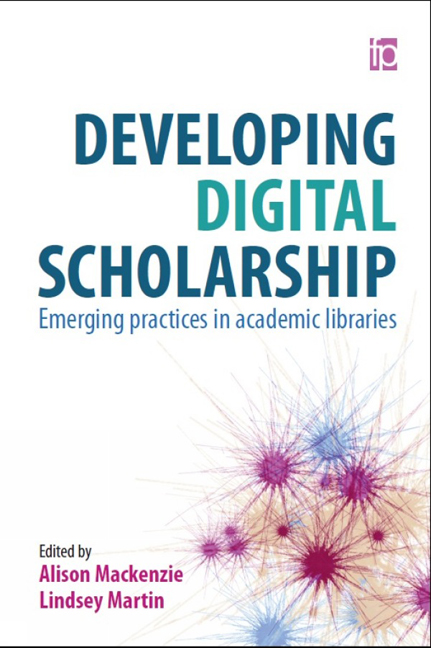Book contents
- Frontmatter
- Contents
- List of figures, tables and case studies
- Editors and contributors
- Introduction
- PART 1 A review of the landscape
- PART 2 The agile librarian
- PART 3 Digital spaces and services
- PART 4 Communications and social networking
- 8 Social networking with the scholarly community: a literature review
- 9 Developing digital scholars: from the ivory tower to the Twittersphere
- 10 Reflections on digital scholarship: so many reasons to be cheerful
- Index
8 - Social networking with the scholarly community: a literature review
from PART 4 - Communications and social networking
Published online by Cambridge University Press: 08 June 2018
- Frontmatter
- Contents
- List of figures, tables and case studies
- Editors and contributors
- Introduction
- PART 1 A review of the landscape
- PART 2 The agile librarian
- PART 3 Digital spaces and services
- PART 4 Communications and social networking
- 8 Social networking with the scholarly community: a literature review
- 9 Developing digital scholars: from the ivory tower to the Twittersphere
- 10 Reflections on digital scholarship: so many reasons to be cheerful
- Index
Summary
Introduction
To remain relevant to the ever-changing needs of its patrons, an academic library must have a strategic aim of adapting to the developing technological and information landscape. The establishment of strategies to support digital scholarship is an important step on this journey and librarians must remain engaged with patrons in order to achieve success in this area. This engagement is essential for two reasons: (i) so academic libraries can advise scholars on how digital research activities can be incorporated into their work and (ii) to build close collaborative connections with researchers in order to facilitate the continuous development of relevant library services. Librarians therefore must not only gain knowledge of the new digital tools, systems and processes, but also new ways of engaging patrons. Social networking sites (SNS) have introduced new opportunities for academic libraries to engage with patrons. SNS usually enable information, digital video, audio, photographs and music to be fed into a personal space that can be shared with others. SNS also provide a platform where people can engage with one another. Engagement is a two-way exchange and can be defined as ‘some action beyond exposure, and implies an interaction between two or more parties’ (The Conclave, 2013, 6). In this chapter, we explore published literature discussing patron engagement using SNS, methods that have a positive impact on patron responsiveness and patrons’ views on library engagement through SNS. We will also discuss prevalent themes in the literature. These will cover methods for measuring the success of engagement using SNS and factors that should be considered by libraries wishing to engage with patrons through SNS.
Defining social media and social networking sites
Social media is increasingly popular, and in the USA is used by 90% of young adults aged 18 to 29 (Perrin, 2015). Junco (2012) studied 2368 American college students and found that those who were using Facebook spent an average of 101 minutes on the site each day. The findings of another American study suggest that online engagement is becoming ever more popular with young people; 34% of 12- to 24-yearolds now prefer to collaborate online rather than in person or via phone, as opposed to 19% for older generations (Meeker, 2015). This highlights the importance of online engagement for academic libraries, with many of their patrons being in this sector.
- Type
- Chapter
- Information
- Developing Digital ScholarshipEmerging practices in academic libraries, pp. 141 - 156Publisher: FacetPrint publication year: 2016



